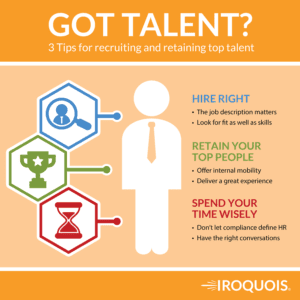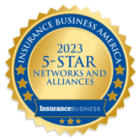Although not all independent insurance agencies have room for an individualized Human Resources Department, focusing on employee experience is still important. HR expert Stephanie Duperrouzel, shares her experience on what it takes to hire and retain great employees as well as the latest trends in people management. For example, leaders today need to focus on designing a compelling employee experience and doing right by every employee or they risk losing their most important assets. With five generations in the workforce all wanting something different, this can be a daunting task.
Edwin K. Morris (3s):
Welcome to the trusted advisor podcast brought to you by Iroquois group. Iroquois is your trusted advisor in all things insurance. I am Edwin K. Morris today. Our guest is Stephanie Duperrouzel. She is an HR professional with over 19 years of experience, delivering innovative and pragmatic human resource and technology solutions. Stephanie has a bachelor’s in science from Columbia university and serves as a board member on the Briar cliff Manor education foundation. As far as hiring out there in any industry, who is responsible for getting the right fit to the culture?
Stephanie Duperrouzel (43s):
That’s a great question. I think it’s a partnership depending on what industry and how large your company is. It’s kind of, it could be a partnership. It could be a partnership between your recruiter and your hiring manager, or in some industries like retail it’s just the hiring manager. There are no recruiters when it comes down to that type of recruitment, but in the end, working with, even if it’s working with a recruiter and a hiring manager, in the end, it’s the hiring manager to make sure to pick the right fit for the culture and that team.
Edwin K. Morris (1m 15s):
So in my experience, I’ve seen where most organizations at a director level or at the, at the work side are responsible for coming up with what that job is supposed to be doing, right? The writing the job descriptions and all those sorts of things. Is there a trend to try to get those, as you said, the manager at that level, the hiring manager, more involved with writing all that information, because it seems to me that that is a weak link for most organizations.
Stephanie Duperrouzel (1m 45s):
Yes. There is a trend for the hiring manager and even there is a trend we’re seeing out there that the incumbents, so someone that’s doing that job day in and day out that is a superstar, to help write that job description. So we’re actually seeing companies out there asking one of, someone who’s actually filling that role today to work on writing the job description with a hiring manager
Edwin K. Morris (2m 8s):
Versus the other way around.
Stephanie Duperrouzel (2m 10s):
Correct. Very much so because recruiters may look at it with a different lens to make sure for diversity, inclusion in the marketplace, but you always want to put the most knowledgeable person in writing that job description because, you know, in the end it comes down to, if you do hire someone and you’ve promised that different job to them, they’re going to be unhappy. So, you know, looking a year out at the candidate who came into your company, better to have the right job description. So they understand what they’re interviewing for.
Edwin K. Morris (2m 45s):
So HR is not only the front end, right? It’s not always the onboarding, it’s keeping the good people still in the company. Right. So how much of that work is, does HR take?
Stephanie Duperrouzel (2m 57s):
Very much so. With a focus on future of work, with the focus of having fluidity between your talent across the globe, across different divisions and different job designs. So HR, you know, when you’re looking into HR strategies, there’s a high focus on internal mobility and moving people around in the company, and that is fully aligned with HR and what they’re looking to do for the business and the company
Edwin K. Morris (3m 23s):
It ends up creating such a disruption when people leave that, if you’re especially trying to fill that same role, and there’s somebody, the vacancy is there. That ends up causing so much disruption, it’s almost better to put the money into keeping that person and maybe move them to a different, if they’re looking for a change, correct?
Stephanie Duperrouzel (3m 43s):
Yes. If they’re looking for change and you’ll see, usually within businesses, there’s more than one person looking for a change and it may be part of a change. It may be fully change. Also, you know, in HR, we also say that if you are comfortable, you’re probably not growing, right. There’s a little bit, if you want to have a little bit of uncomfortableness in your job, so that you’re have a growth mindset. And I think that companies are looking within themselves and their own companies and their own people to say, how might we give someone a new opportunity to try something new and maybe even step up and do something, so very much so. You know, even the level to get product to productivity for the business is faster.
Stephanie Duperrouzel (4m 25s):
If it’s an internal movement,
Edwin K. Morris (4m 27s):
Is that industry specific or does that just kind of a general that fits everybody
Stephanie Duperrouzel (4m 33s):
That fits every, and especially right now with five generations in the workforce and with the future of work, with a lot of automation coming into play so that we can, you know, humans make decisions, right? And the automation there is just to crunch the data so that we can make the decision. Across all industries that I’ve been working with, this is very much internal movement. There’s always a will and a time and a need to do external recruitment, right? We always, you know, no company is probably, you know, less, attrition rates are usually around the 10% that, you know, companies will be looking externally, but there’s a focus on having internal movement with the different generations and millennials, you know, with the millennials, they are very much looking to change jobs within a year or two years.
Stephanie Duperrouzel (5m 20s):
So giving them the, instead of having them look externally, giving them that opportunity
Edwin K. Morris (5m 24s):
Yeah, to build longevity and the, because in the long run, you’re going to build institutional knowledge. That’s going to be invaluable.
Stephanie Duperrouzel (5m 31s):
Correct. And if it’s a great culture fit, that’s invaluable too. If you have a culture fit, they enjoy the leadership, they enjoy the company. That’s invaluable. There’s always, if you have continuous learners, you can always learn new skill sets.
Edwin K. Morris (5m 45s):
How much is HR is regulations? How much of HR is government?
Stephanie Duperrouzel (5m 50s):
Yeah. So the law, so give me governed by laws or regulatory means.
Edwin K. Morris (5m 54s):
Yeah. How much of that is it? You know, if you had to break out a, a calendar years worth of HR work, how much of it is just compliant?
Stephanie Duperrouzel (6m 1s):
Well, depending on what country you’re in, cause I’ve worked in a very lots of global things, but in the U S there’s a lot less regulatory. So I would say maybe 20% is compliance work at this point in time. And a lot of systems, you know, if you have a system, a lot of systems account for that compliance work too, so that you can progress. If you can configure that into the system, you know, HR is very much there to step back and have the right conversation with people and working on that people experience and the expectations from an employee,
Edwin K. Morris (6m 38s):
If there’s, one of our listeners is a midsize company, what, what are some things, because not everybody’s going to have an HR manager or those types of attributes, a company size dependent, right. Really big companies would have all these parts and pieces, but what, how does a small company get their hands around HR?
Stephanie Duperrouzel (6m 56s):
I think even the big companies are very much going back to keeping it simple and having the best people experience and any company, if you’re a small, large, medium should, is looking for that, right. You kind of talked about compliance. There is some compliance needs, but if there’s not a compliance need, to keep it simple, I can change my address in Amazon very simply, I should be able to do that within my company very simply. So I think even how big your company is to keep it simple and keep it in simple language so all employees can understand it. And then also to focus on people experience and having the right conversations and doing the right by every employee at the company.
Edwin K. Morris (7m 42s):
Is there an industry model of where HR is just outsourced?
Stephanie Duperrouzel (7m 45s):
In the past, you’ve heard, it’s not completely outsourced, but more of the Proctor and gamble’s and such have a large outsourcing so that they outsource the transactional work, the recruitment, all that stuff. When it comes down to talking about internal mobility, when it comes to working on a leave of absence, that normally stays in-house even when you have an outsource provider. So would say many in an industry of like consumer goods and services, that’s where those have been leaders in moving to a more, a higher outsourcing model.
Edwin K. Morris (8m 23s):
What’s the biggest challenge for HR now?
Stephanie Duperrouzel (8m 26s):
I think the biggest, some big challenges is workforce. So there’s five generations in the workforce. That’s a big challenge because you may have, you know, from a millennial till someone that’s looking to retire. So a lot more generations within the workforce. Again, going back to that people experience, I think there was pendulum switching to standardize and do all that work around HR, but very much focused on having a people experience. So a challenge is around, you know, making sure that you have right resources, having those discussions, and having that experience for your employees. And then in some of the bigger corporations, it’s really around the digital experience for employees, we at home are on our phones.
Stephanie Duperrouzel (9m 9s):
Talk to our Alexas, you know, you may have VR. We go to work and it’s like going back in time that we don’t have that digital experience. We call it the Monday blues, you get the Monday blues. I have at home in my personal life and my retail world, I have a very good digital experience. And I think a lot of companies are focused on how do they bring that to every employee when they come to work?
Edwin K. Morris (9m 31s):
Yeah. I mean, that’s that customer customer experience, right? User experience, it’s being able to make all that not cumbersome, easy to use, accessible 24 seven. What’s so difficult about this in this day and age.
Stephanie Duperrouzel (9m 45s):
And I think that you’ve got it nailed. And I think where the, as we talked about, a lot about people experience and that’s very much come from the customer experience from the retail world. Now business are like, wait, if we’re giving a great customer experience, every person in our company is also a customer. Why aren’t we giving them a great people experience? Like, yeah,
Edwin K. Morris (10m 4s):
No kidding. That’s a great point. How many organizations are not there yet? I mean, is this, do you find any industries that are leading that concept?
Stephanie Duperrouzel (10m 13s):
If you look at industries that may be a little bit ahead of it is retail and consumer goods and services because of, you know, they’re pulling and saying, what do we do for customers? Let’s do that for our employees too. So I think they could be the ones more leading in that area
Edwin K. Morris (10m 28s):
And the long, and the more resource you put into that type of internal facing interface, the user experience for the employee has to add value to the longterm, keeping those folks in the business, keeping them there, longevity,
Stephanie Duperrouzel (10m 45s):
Correct. They want it. If you see like Richard Brockman and some of them, once you make your employees happy, they will sing that and praise it and help that with your customers, right? Every happy employee is exponentially better for your customer. So if you look to make the employee experience great, the customer experience will follow.
Edwin K. Morris (11m 5s):
Well, the last question I’ll ask is, so if you’ve got a small company and you’re going to advise this leader of the small company, what would be their best question to ask in an interview that helps get that kind of 21st century skillset that’s needed for an agile workforce, more than just a CV. Cause you’re talking about character, ethos, things that are behind a person’s motivations. You know what I mean? It’s more than just where’d you go to school and what’d you get a degree in, you know, it’s so much more than that.
Stephanie Duperrouzel (11m 38s):
There is some people that say, they talk about your, talk about your family a little bit, right? There’s a question around family, because what you learn about family is very enlightening on how they, what kind of culture they come from. Right? Another thing I think for that agile mindset and behaviors, if they can talk about a project that they worked on or an, a product that they worked on for the customer, something to get in that agile mindset and behavior of working within a team, working on something customer facing, and then something, maybe another question would be around the timing of, you know, tell me a time where you’ve had to break it down a large piece of work into small chunks and rolled out things continuously, not that waterfall.
Stephanie Duperrouzel (12m 24s):
Right. So if we were talking about HR, tell me a time that you were looking to simplify policies throughout the company. And how did you go about that? Because it could be very enlightening if they did a big bang, if they rolled out and lessons learned from that, if they kept it simple, not in legal jargon. So I think if you ask like kind of a, some around a project that they have had, you know, tell me about a project, you know, maybe with policy, maybe with processes, maybe with rolling out a technology and then peppered in with other questions to see if that, if that agile mindset and behavior is there.
Edwin K. Morris (13m 3s):
Well, I think that’s great advice. Thank you, Stephanie. And thank you for being here and sharing your, your world experience.
Stephanie Duperrouzel (13m 10s):
Well, thank you for having me and I look forward to talking again.
Edwin K. Morris (13m 13s):
Thanks for listening to this edition of the trusted advisor podcast brought to you by Iroquois group. Iroquois, your trusted advisor for all things insurance, and remember get out of the office and sell. This program was recorded live at the Cohen multimedia studio on the grounds of Chautauqua institution. I am Edwin K. Morris, and I invite you to join me for the next edition of the trusted advisor podcast.



